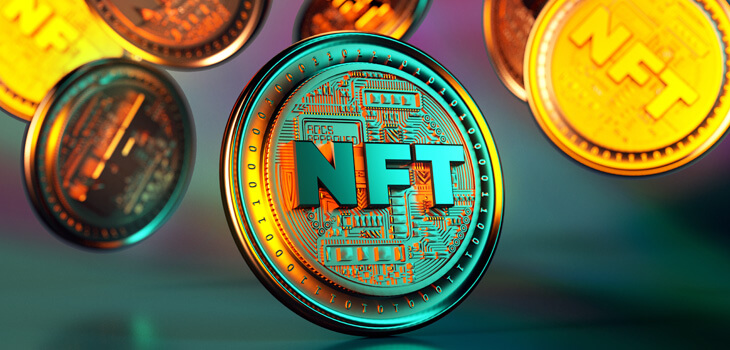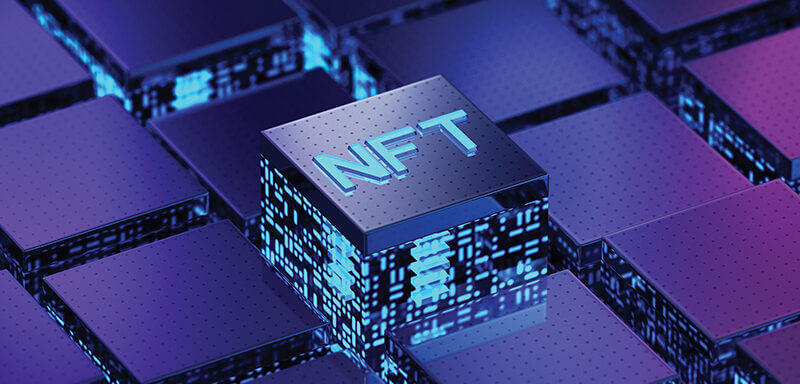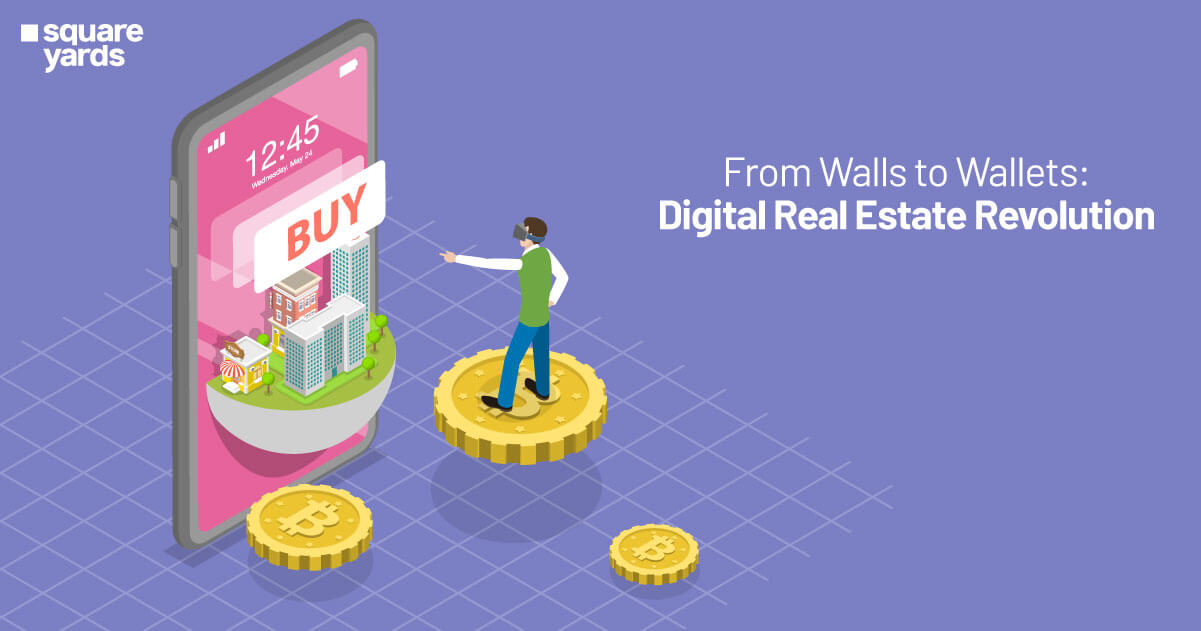Did you know that investing in NFT goes beyond art? They extend to gaming, music, and even real estate! The digital world has opened the pathway to a new universe of art and innovation. In real estate, these digital tokens are introducing innovative ways to represent and exchange properties. Real estate can be tokenised using NFTs by converting a real estate asset into a token on the blockchain and selling it. The potential of real estate tokenisation with the NFT stock market is beyond imagination. So, how will the NFTs start to help real estate in the future? What’s your level of crypto and real estate knowledge? Stay tuned to learn more about how NFTs are redefining art and digital property.
Role of NFTs In The Real Estate Market

Welcome to Metaverse Monopoly! Where Simple Investing in NFTs Create Significant Returns! Since Web3 is the new wave of the internet, instead of riding along, we all must know how to ride on it the right way. Plus, it’s crucial also to avoid scams that make us lose our hard-earned money. With AI dominance, it’s super important to stay on top of the latest trends and technologies that are driving the technology forward.
But before investing in NFT real estate, it’s crucial to understand what an NFT is. The NFT stock market is more than just ape jpegs. Think of non-fungible tokens (NFTs) as unique digital tokens stored on a secure online ledger called a blockchain. This token represents ownership of a specific piece of property. This can be anything from a whole house, a piece of it, or even a rental income stream.
We all witnessed cryptocurrency being onboarded by the gaming and music industries; in fact, some countries even accept it as legal tender. As blockchain and cryptocurrency diversify their use cases into different industries, it will continue to affect how people buy and sell products via blockchain technology. Now, the real estate industry is pursuing its shift towards the blockchain with the creation of non-fungible tokens that represent physical properties.
It’s a blockchain for the transfer of the most valuable assets in one’s life. With proven technology that is absolutely legal, homeownership transfers from one wallet to another are now possible. In conclusion, entrepreneurs are finding ways to bring liquidity to real estate investing, and asset tokenisation is the go-to solution for this.
Digital Vs. Physical Real Estate: Which One is Better?
Similar to real-world land, digital real estate refers to specific sections within a platform’s space that are registered as NFTs. Since it’s a virtual space, you don’t have any regulatory rules allowing users to construct almost anything they want in the metaverse. For example, Decentraland has 90,601 plots, each traded as a special NFT called LAND. And people are buying them using a cryptocurrency called MANA.
To understand it better, let us take an example – Imagine owning two kinds of property: a cosy beach house in Hawaii and a booming Instagram account. One is tangible property, like houses and land, while the other is digital, like a website or a social media handle. The physical needs maintenance; on the other side, the digital needs updates. Both can grow wealth, where physical offers stability and digital brings potential quick wins. Now, you decide to invest in the NFT stock market wisely and enjoy the view!
|
Feature |
Digital Real Estate |
Physical Real Estate |
|
Tangibility |
As traded in virtual space, they are intangible. For example, domains, NFTs, etc. |
As the name implies, they are tangible, physical structures. For example, houses, apartments, land, etc. |
|
Location |
Digital assets can be accessed from anywhere on the internet. |
Physical assets are bound by geographical location. |
|
Scalability |
These are highly scalable and can expand their reach and audience easily. |
These have limited scalability as physical space restricts growth potential. |
|
Liquidity |
It is easier to buy and sell digital assets. |
Complex legal processes are involved in property sales. |
|
Maintenance |
Lower maintenance costs as we are primarily focused on digital upkeep. |
Higher maintenance costs require physical repairs and upkeep. |
|
Income Potential |
Diverse income streams like advertising, subscriptions, and rentals. |
Primarily, rental income has the potential for appreciation through property value. |
|
Examples |
Websites, domain names, social media accounts, and virtual land in the metaverse |
Houses, apartments, commercial buildings, and land plots |
How Can Real Estate Be Tokenized Using NFTs?

Now that we know what NFTs are and how they are making a boom in the real estate market let’s understand how they actually work. Like any other NFT, real estate NFTs are unique digital tokens stored on a blockchain, a secured and transparent public ledger. This digital token will represent ownership of a specific property, whether a physical house or a virtual plot of magical metaverse land. Think of it like one-of-a-kind ownership, where each token is linked to specific data about the property, such as its location, description, and ownership history. This data is encrypted and is made publicly viewable on the blockchain network. Hence, the information is tamper-proof and easily verifiable. Let’s dive into the steps to know exactly how real estate works.
-
- Tokenization: Firstly, the property is linked to a non-fungible token. This can be done through a smart contract, which is a self-executing program on the blockchain.
- Listing and Sale: The listed NFT on the marketplace represents the property, just like houses are listed on traditional real estate platforms. Potential buyers can simply browse the listings to view property details and make offers.
- Transaction: Once a buyer and a seller agree on a price, the NFT is transferred from the seller’s digital wallet to the buyer’s wallet with a cryptocurrency exchange.
- Ownership: Finally, the buyer now owns the NFT, representing the ownership of the underlying property. The record is now permanently stored on the blockchain, providing a transparent and secure chain of titles.
Turning Mortgages into NFTs
The potential of NFTs in mortgages is shaking up the market. The blockchain and real estate meetup is changing how we think about home ownership and investment. But how exactly do these fancy certificates work in the mortgage world? LoanSnap, using the Bacon Protocol, has introduced the first NFT mortgages as home equity loans. Instead of traditional mortgage notes, they issue NFTs after processing loans like regular mortgages. Only a few NFT mortgages exist and are not yet accessible to investors. LoanSnap aims to release a stablecoin called bHome, representing partial ownership in an NFT mortgage note. Investors can support more NFT mortgages by funding future borrowers.
Benefits and Challenges of Investing NFT Real Estate
As it’s a relatively new concept, it’s difficult to evaluate the benefits and challenges of real estate NFTs exactly. However, based on the various outcomes of the experiments taking place, below is a list of advantages and disadvantages to help you understand better.
Benefits of Investing in NFT
-
- Increased Liquidity: NFTs can represent fractional property ownership, making them more affordable to investors. Additionally, it will also increase liquidity in the market.
- Faster Transactions: Smart contracts can automate tasks like payments and paperwork. Hence, will result in potentially speeding up the buying and selling process.
- Enhanced Transparency: The USP of blockchain is its secure record keeping. It provides a transparent and tamper-proof record of ownership history, reducing the risk of fraudulent activity.
- Global Market: Its borderless investment allows investors to exchange NFTs anywhere in the world. Therefore, it opens up the real estate market to a wider pool of investors.
Drawbacks of Investing in NFT
-
- Regulatory uncertainty: The legal and regulatory landscape surrounding real estate NFTs is still in its evolving stage. This creates some uncertainties for investors.
- Valuation: Valuing NFTs can be challenging, as there is limited historical data. Moreover, it may also apply a different valuation method.
- Technology Dependence: If you are investing in this NFT digital real estate, it’s crucial to understand and be comfortable with digital wallets, cryptocurrencies, and blockchain technology.
- Limited Adoption: The real estate NFT stock market is still in its infancy. Widespread adoption may take time.
Overall, real estate NFTs represent a new and innovative way to own and invest in property. While there are still some challenges to overcome, the potential benefits are continuously attracting interest from both investors and traditional real estate players.
NFTs: A Future of Real Estate
Ever thought about the way future real estate deals incorporate NFTs? Although the collaboration of NFT and real estate is a little new in the market, blockchain technology and other tools in the crypto toolbox are providing rising opportunities for creating mortgages and generating crowdfunding opportunities. Various sources have predicted its rise to be seen in a larger picture. Ultimately, we cannot deny that cryptocurrency is bringing a new experience for real estate NFT investors. This NFT is creating millionaires.
Here are some mind-blowing stats that will depict the booming stage of NFT in real estate:
-
- The global digital real estate market is projected to reach $1 trillion by 2025.
- The average cost of a domain name is around $10 per year, while the median price of a single-family home in the US is over $400,000.
- The rental vacancy rate for apartments in the US is around 5.8%, while the average return on investment (ROI) for rental properties is around 10%.
- The metaverse market is expected to reach $800 billion by 2024, with virtual land parcels fetching millions of dollars.
Ending Note
We have roads, neighbourhoods, cities, states, countries, and the metaverse. Many experts look at the metaverse as a 3D model of the internet. If you ever put on a virtual reality headset to spend time in digital life, you have visited the metaverse. One such trend that has been making waves is the emergence of the Metaverse, a virtual space where people can interact with one another in real-time using advanced technology. In addition, the rise of non-fungible tokens (NFTs) has provided a new way for people to buy and sell unique digital assets, including virtual real estate. Hence, understanding the metaverse and how to transact with NFTs will help buyers who want to unlock a whole new world of possibilities and explore these new frontiers.
You May Also Read :
|
Guide To Cryptocurrency Investment |
|
|
How To Invest in Real Estate NFT |
|
|
Insides of Home Value Estimator |
|
|
Boost Resale value of home |
Frequently Asked Questions (FAQs)
Can you make money investing in real estate NFTs?
Yes, fractional ownership and virtual rentals show promising results. However, it's a risky but potentially rewarding market.
What can you legally do with an NFT?
Depending on the platform, you can usually resell, display, or use it for things like advertising.
What is the most expensive NFT ever sold?
Pak’s “The Merge” is the highest price NFT, at an incredible $91.8 million.
Can I tokenize my real estate?
Yes, but be aware of legal challenges. Check local rules and proceed carefully, as it can be complicated.
How much does tokenisation cost in real estate?
Be prepared to spend a few thousand dollars, as the costs depend on its complexity and location.



































